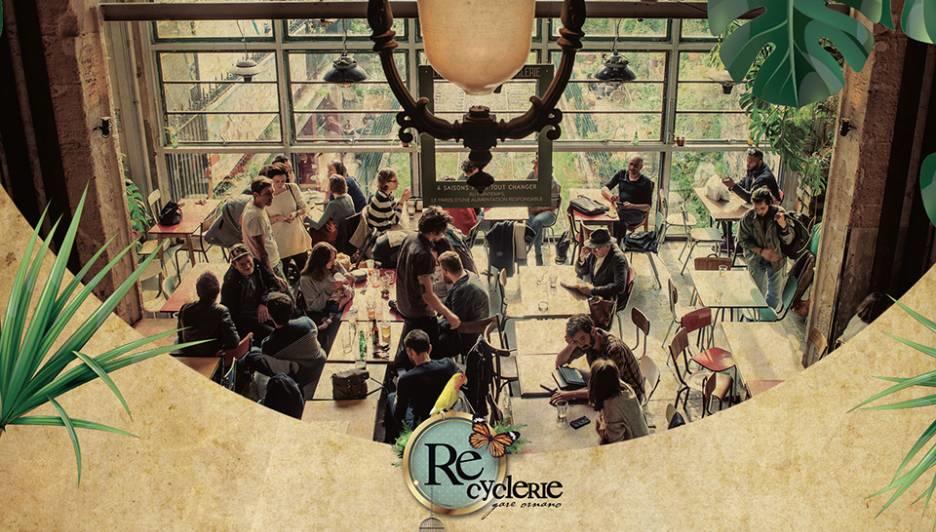The 2nd edition of the ELLE Green festival took place on the weekend of June 12-13 at the Goodplanet Foundation in Paris, in partnership with Veolia. Workshops, round tables, screenings, cooking classes, tutorials and more, were all on the program under the theme: "Living in harmony with nature", in other words, reconsidering our way of consuming and thinking in order to be in harmony with the living world that surrounds us. During the round table "Little is better? In praise of happy sobriety", Veolia shared its support for the development of the innovative model of eco-responsible third places - real spaces for experimentation, social links and awareness-raising aimed at all stakeholders in the territories to the challenges of ecological transformation.

Creating links, seeking a balance between stakeholders on societal issues
Fanny Demulier - Head of Veolia's Purpose and CSR Communication - explained the need to raise awareness and mobilize individuals in order to truly drive change in our production and consumption patterns, and create a collective momentum.
Veolia has defined its Purpose and set a long-term course: the Group is aiming for multi-faceted performance which places the same high expectations on financial, societal, environmental, commercial and social issues. Our priority is to engage all our stakeholders - our clients, our investors, our employees, etc. - in order to move forward, and together find a well-balanced impact in the interest of the greatest possible number of people. This is why, for Veolia, the connection to nature, which is based in particular on taking into account issues linked to the consumption of resources and the pollution emitted, will first of all require awareness and changes in individual behaviour in our ways of thinking and doing , stated Fanny Demulier in her introduction.
Third places to raise awareness and mobilize as many people as possible
La REcyclerie in Paris, in which Veolia has been the main partner since it opened in 2014, welcomes a large audience and offers a variety of activities: an urban farm, set up on a former railway site, to raise awareness of local and responsible food; a workshop for repairing tools and household appliances, to rethink the notion of use and combat programmed obsolescence; and also a library on the environment, supported by the Veolia Foundation as part of the Environment Book Prize. The venue also offers a free program of events accessible to the general public to help them learn, understand and discuss today's major environmental and societal issues.
Did you know, for example, that we use a drill for an average of 12 minutes in a lifetime! At La REcyclerie in Paris, it is repaired, shared and lent to members... This third place aims to make as many people as possible aware of eco-citizen practices. 600 people come every day from all walks of life with very different expectations, and the La Recyclerie club has 600 members. The partnership with Veolia provides essential support for the eco-cultural program, which offers more than 500 events per year, free of charge and accessible to everyone (conferences, meetings, workshops). This partnership also makes it possible to replicate and spread the model elsewhere, proving that small players and large companies can work together to raise awareness and mobilize as many people as possible on environmental issues, explained Marion Bocahut, eco-cultural project manager at La REcyclerie.

Third places, to meet local societal and environmental challenges
Co-constructed by Veolia and its local partner, The Maker Space Foundation, the third place Le Baobab in Durban (South Africa) was inspired by the model adopted by La REcyclerie in Paris.
Baobab is a third place adapted to the context in South Africa. It is centred on recycling plastic waste: for example, we have created combs from plastic bottle caps. At Baobab, we are responding to one of the societal challenges facing the city of Durban by training 300 young women in entrepreneurship. We also have a gardening introduction program in schools designed to make a longer-term environmental impact. Our partnership with Veolia gives us the resources to implement change at a local level, explained Steve Gray, manager of the Durban Baobab and founder of The Maker Space Foundation in South Africa. .

Together leading a collective battle for the Planet
For Veolia, third places are where the ecological transformation is organized in practice, through the local solutions they provide to their territory and its stakeholders (citizens, local authorities, associations, businesses, etc.).
These third places, which are very inclusive, allow us to share these common challenges and fight this collective battle for the planet together. For example, in Niamey, Niger, L'Oasis is another third place initiated by Veolia, dedicated to women's entrepreneurship and women's empowerment, with the association Empow'Her. All these third places are designed on the basis of the needs of the territories and the people who are involved in each context. They have a long-term impact. In addition, we have several new projects under discussion, continued Fanny Demulier.
Veolia's purpose requires it to meet more societal obligations
Veolia's core business is the environment. Its positioning: the ecological transformation to step up the pace of the transition by providing more virtuous solutions. For example, treating pollution or waste in local circular economy loops. Or choosing to invest in the transformation of facilities to replace coal with green energy, as in Pecs (Hungary) where Veolia heats the city with wood and straw. Or, during the health crisis, to protect its employees on the front line on public highways.
Our purpose requires us to be more demanding with regard to societal issues, with a broader vision of our impacts and more cooperation between all our stakeholders, concluded Fanny Demullier.

